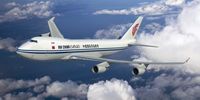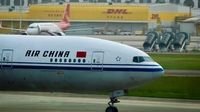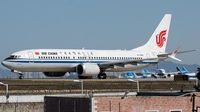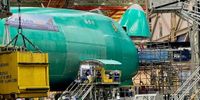Boeing (BA) is facing significant challenges as the ongoing trade war between the United States and China escalates. On Tuesday, April 15, 2025, shares of the Seattle-based aircraft manufacturer dropped by 2.2% shortly after the market opened, following reports that the Chinese government had ordered its airlines to cease accepting deliveries of Boeing aircraft. This move is seen as a retaliatory measure in response to the heightened tariffs imposed by the U.S. on Chinese imports, which have reached as high as 145%.
According to a report by Bloomberg, the Chinese government has also instructed its airlines to halt purchases of aircraft-related equipment and parts manufactured by U.S. companies. This decision comes as Chinese carriers are on the brink of receiving about 10 Boeing 737 Max aircraft, which are now caught in the crossfire of the trade war. Delivery paperwork for these planes may have been completed before the tariffs took effect on April 12, 2025, allowing for a case-by-case entry into China.
The ongoing trade war has been marked by tit-for-tat tariffs, with the U.S. imposing tariffs on Chinese imports, which prompted China to respond with its own tariffs on American goods. The U.S. has levied tariffs as high as 145% on Chinese imports, while China has retaliated with tariffs of 125% on U.S. products. This escalating conflict has raised costs for both countries and created uncertainty in the global market.
Bloomberg's report indicates that the Chinese government is also exploring ways to support domestic airlines that are facing increased costs due to leasing Boeing jets. With the new tariffs in place, the cost of U.S.-made aircraft and parts has more than doubled, making it impractical for Chinese airlines to accept new deliveries from Boeing. The decision to halt deliveries effectively blocks Boeing from one of the world's largest airline markets, which is projected to account for 20% of global aircraft demand in the coming decades.
In an effort to manage the situation, Boeing had previously hoped to clear its inventory of aircraft built before 2023 by the end of the year, allowing it to shut down its shadow factories. However, the current trade tensions have complicated those plans. During a recent conference, Boeing executives expressed optimism about moving aircraft inventory, but the recent developments have cast doubt on their projections.
As of now, Boeing's stock is down 9.2% for the year, reflecting the broader impact of the trade war on its operations. The company has faced a tumultuous period, dealing with lawsuits, mechanical failures, and a leadership shake-up in 2024. The latest news from China adds to the list of challenges the aerospace giant must navigate.
The implications of these developments extend beyond Boeing, as competitors like Airbus are poised to benefit from the situation. With Chinese carriers holding a backlog of 130 aircraft from Boeing, the halt in deliveries may open the door for Airbus to capture a larger share of the Chinese market. In fact, Airbus has already secured a significant number of orders from Chinese airlines, further complicating Boeing's position.
In summary, the trade war between the U.S. and China has reached a critical juncture, with Boeing caught in the middle. The company's struggle to maintain its foothold in one of the largest aviation markets in the world underscores the broader economic tensions between the two nations. As both sides continue to grapple with the consequences of their trade policies, the future of Boeing and its relationship with Chinese airlines remains uncertain.





